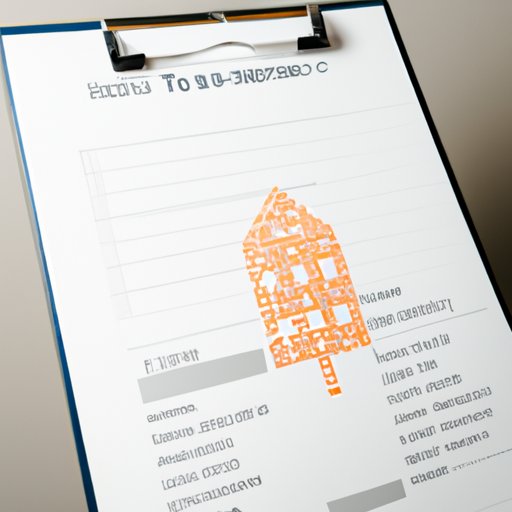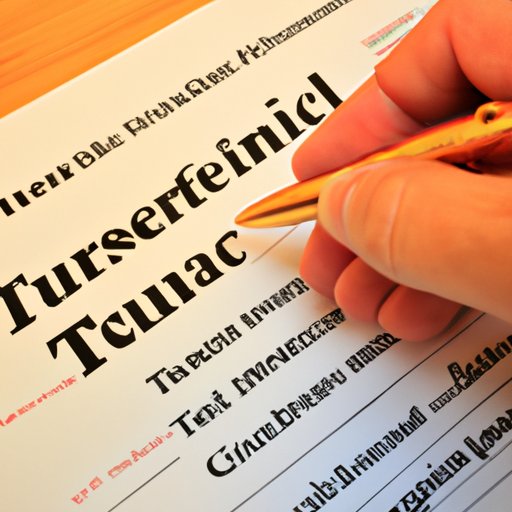Introduction
A trust is a legal entity that allows an individual to manage their assets and property for the benefit of another person or entity. Establishing a trust can provide numerous advantages, such as protecting assets from creditors, avoiding probate court costs, and minimizing taxes. However, it is important to understand the associated costs before taking the plunge and setting up a trust.

Calculating the Cost of Setting Up a Trust
When considering the cost of creating a trust, there are three main factors to consider: professional fees, administration costs, and potential tax implications. Professional fees include attorney fees, estate planning consultant fees, accounting fees, and investment management fees. Administration costs may include appraisal fees, record keeping costs, and other miscellaneous fees. Finally, it is important to consider any potential tax implications that may arise when transferring assets into the trust.
Breaking Down the Expenses of Establishing a Trust
The actual cost of setting up a trust will depend on several factors, including the complexity of the trust, the type of trust being created, and the services provided by the professional advisors. Attorney fees typically range from $1,500 to $3,000, depending on the complexity of the trust. Estate planning consultants may charge anywhere from $200 to $1,000 for their services. Accounting fees can range from $750 to $2,500, depending on the number of assets being transferred into the trust. Investment management fees vary widely, but typically range from 0.25% to 1% of the total assets in the trust. Appraisal fees will depend on the type of asset being appraised and may range from a few hundred dollars to several thousand dollars.
The True Cost of Forming a Trust
In addition to the professional fees and administration costs, there are other factors that can influence the overall cost of setting up a trust. For example, the size of the trust and the number of beneficiaries will have an impact on the total cost. Also, different types of trusts have different associated costs. For example, revocable trusts are generally less expensive to set up than irrevocable trusts, since they do not require as much paperwork and documentation.

What to Expect When Creating a Trust
When setting up a trust, it is important to understand the steps involved in the process. The first step is to meet with professional advisors to discuss the specifics of the trust and determine the best course of action. Once the details have been established, the trust agreement must be drafted. After the trust agreement has been signed, the trust must be funded. This involves transferring the designated assets into the trust.

Assessing the Financial Investment of Setting up a Trust
When calculating the cost of setting up a trust, it is important to consider both the short-term and long-term costs. In the short-term, the initial professional fees and administration costs can add up quickly. However, in the long-term, the benefits of investing in a trust may far outweigh the initial costs. Investing in a trust can help protect assets from creditors, minimize taxes, and avoid costly probate court proceedings.

Budgeting for Establishing a Trust
When budgeting for the cost of establishing a trust, it is important to prioritize expenditures and determine which resources are necessary. Depending on the complexity of the trust, some of the expenses may be able to be avoided or reduced. Additionally, it may be beneficial to shop around and compare the fees and services offered by different professionals, in order to find the most cost-effective option.
A Guide to the Costs Associated with Creating a Trust
Creating a trust can be a complicated and overwhelming process. The key to success is understanding the associated costs and researching different options. It is important to compare the fees and services offered by different professionals, as well as to understand the terms of service. Additionally, consulting with a qualified attorney or estate planning consultant can help ensure that all of the necessary steps are taken when setting up a trust.
Conclusion
Establishing a trust can be a complex process, and the associated costs can add up quickly. It is important to understand the different fees and expenses involved in setting up a trust, as well as the potential tax implications. Additionally, it is important to assess both the short-term and long-term costs of establishing a trust, and to prioritize expenditures accordingly. With careful research and consideration of the associated costs, it is possible to create a trust that meets the needs of the trustor while staying within a reasonable budget.
(Note: Is this article not meeting your expectations? Do you have knowledge or insights to share? Unlock new opportunities and expand your reach by joining our authors team. Click Registration to join us and share your expertise with our readers.)
